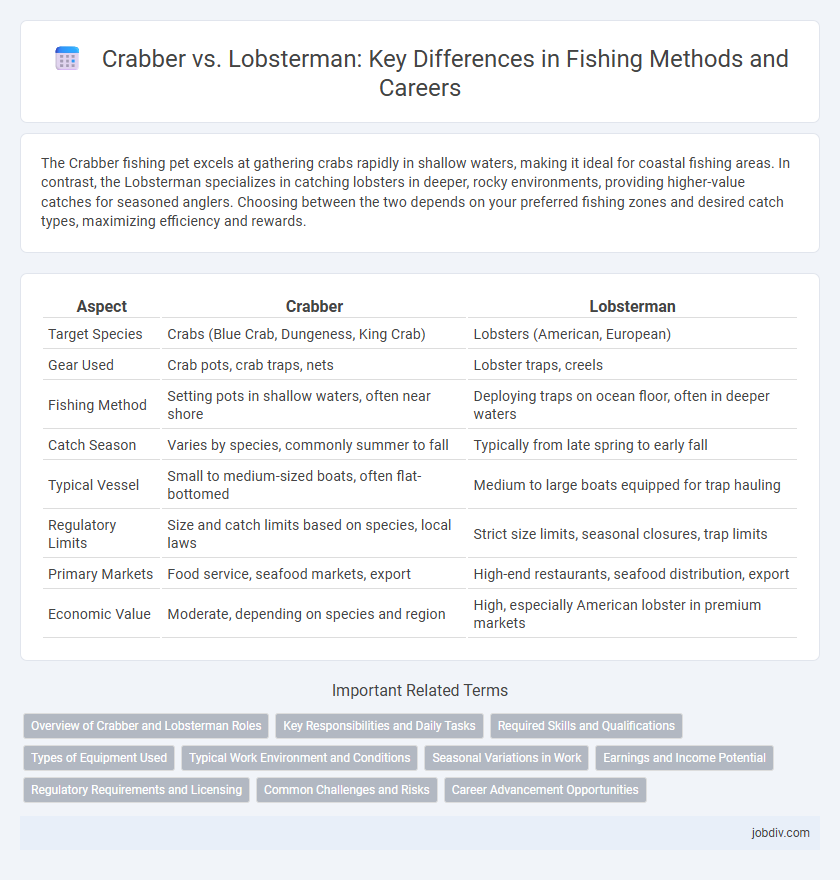The Crabber fishing pet excels at gathering crabs rapidly in shallow waters, making it ideal for coastal fishing areas. In contrast, the Lobsterman specializes in catching lobsters in deeper, rocky environments, providing higher-value catches for seasoned anglers. Choosing between the two depends on your preferred fishing zones and desired catch types, maximizing efficiency and rewards.
Table of Comparison
| Aspect | Crabber | Lobsterman |
|---|---|---|
| Target Species | Crabs (Blue Crab, Dungeness, King Crab) | Lobsters (American, European) |
| Gear Used | Crab pots, crab traps, nets | Lobster traps, creels |
| Fishing Method | Setting pots in shallow waters, often near shore | Deploying traps on ocean floor, often in deeper waters |
| Catch Season | Varies by species, commonly summer to fall | Typically from late spring to early fall |
| Typical Vessel | Small to medium-sized boats, often flat-bottomed | Medium to large boats equipped for trap hauling |
| Regulatory Limits | Size and catch limits based on species, local laws | Strict size limits, seasonal closures, trap limits |
| Primary Markets | Food service, seafood markets, export | High-end restaurants, seafood distribution, export |
| Economic Value | Moderate, depending on species and region | High, especially American lobster in premium markets |
Overview of Crabber and Lobsterman Roles
Crabbers specialize in harvesting crabs using pots or traps placed on the ocean floor, targeting species like blue crabs and Dungeness crabs primarily found in coastal waters. Lobstermen focus on catching lobsters by deploying baited traps in colder waters, such as the North Atlantic, where American lobsters are abundant. Both roles require knowledge of marine biology, navigation skills, and adherence to strict fishing regulations to maintain sustainable populations.
Key Responsibilities and Daily Tasks
Crabbers primarily focus on setting and retrieving crab pots, sorting the catch, and managing bait to ensure maximum yield of blue crabs or Dungeness crabs. Lobstermen are responsible for deploying lobster traps, monitoring trap lines for legal-sized lobsters, and maintaining trap gear to comply with fishing regulations. Both require knowledge of marine navigation, weather patterns, and seasonal fishing laws but differ in species-specific handling and gear maintenance.
Required Skills and Qualifications
Crabbers must possess strong knowledge of marine navigation, trap setting, and species identification to ensure sustainable harvesting and safety at sea. Lobstermen require expertise in handling lobster traps, understanding seasonal regulations, and boat maintenance skills essential for durable, long-term operations. Both professions demand physical stamina, attention to detail, and a solid understanding of maritime safety protocols.
Types of Equipment Used
Crabbers primarily use baited traps called crab pots that are designed with funnel entrances allowing crabs to enter but not escape, made from wire mesh or plastic-coated steel. Lobstermen rely on lobster traps, which are more robust and larger, featuring multiple chambers and escape vents to protect juvenile lobsters and non-target species. Both types of equipment integrate buoys marked with unique identifiers to track trap locations and ownership effectively.
Typical Work Environment and Conditions
Crabbers typically work on smaller vessels navigating shallow coastal waters, facing harsh weather and rough seas during shorter, seasonal trips. Lobstermen operate larger boats in often colder, offshore environments, enduring longer hours and heavy physical labor in all weather conditions to haul traps. Both occupations demand resilience to hazardous, wet environments and exposure to unpredictable maritime elements.
Seasonal Variations in Work
Crabbers experience peak seasons typically from late fall to early spring when crab populations are most abundant and accessible in colder waters. Lobstermen have a longer but more regulated season, often spanning from late spring through summer, governed by strict quotas and conservation laws to protect lobster populations. Both professions adapt their work schedules and methods according to these seasonal variations to maximize yield and comply with legal frameworks.
Earnings and Income Potential
Crabbers often face higher seasonal income variability due to shorter fishing periods and stricter quotas, while lobstermen benefit from more consistent earnings driven by longer seasons and stable market demand. Lobster traps generate higher average market prices per catch compared to crabs, significantly boosting lobstermen's annual revenue potential. Despite the lucrative lobster market, crabbers may see spikes in income during peak seasons, but overall, lobstering offers greater steady income and long-term financial stability.
Regulatory Requirements and Licensing
Crabbers must adhere to specific regulatory requirements such as seasonal restrictions, trap limits, and size regulations governed by agencies like NOAA and state fisheries departments. Lobstermen face stringent licensing requirements including trap tags, vessel permits, and reporting mandates to comply with conservation laws in regions like Maine and the Gulf of Maine. Both fisheries require adherence to gear specifications and catch reporting to ensure sustainability and legal operation within their respective regulatory frameworks.
Common Challenges and Risks
Crabbers and lobstermen both face unpredictable weather conditions that threaten their safety and catch reliability while navigating harsh marine environments. Gear loss and equipment damage from rough seas increase operational costs, impacting overall profitability for both fisheries. Encountering regulatory restrictions, such as seasonal limits and quota management, further complicates sustainable harvesting practices and economic stability.
Career Advancement Opportunities
Crabbers often face limited career advancement opportunities due to the seasonal and highly specialized nature of crab fishing, which restricts skill diversification and income growth. Lobstermen benefit from a more stable year-round industry that allows for skill enhancement, vessel ownership, and entry into related maritime businesses, fostering greater long-term career development. Access to cooperative systems and regulatory knowledge further propels lobstermen's career advancement compared to crabbers.
Crabber vs Lobsterman Infographic

 jobdiv.com
jobdiv.com